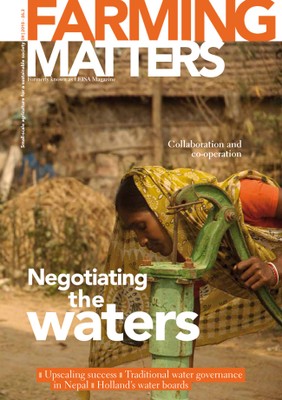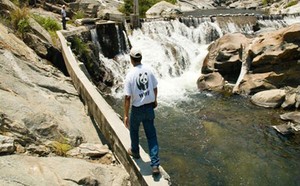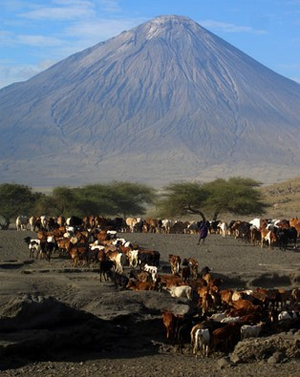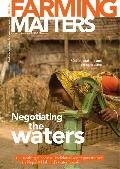AUTHOR
Month: September 2010
Articles
Thirsty agriculture
September 22nd, 2010
As I am writing this editorial, Pakistan is being hit by the most serious floods in 180 years, while Russia suffers from an unprecedented drought. Unequal distribution of water is not new, but the ferocity of fluctuations and contrasts between situations is. Water is being referred to as the new oil, even though there … Read more
Our readers write
September 22nd, 2010
Local resources / From the Brazilian GMO campaign / Payment for Environmental Services (1) / Payment for Environmental Services (2) / More to read Farming Matters welcomes comments, ideas and suggestions from its readers. Please send us an e-mail to ileia@ileia.org or write to P.O. Box 2067, 3800 CB Amersfoort, the Netherlands. Local resources … Read more
 NEGOTIATING THE WATERS
September 22nd, 2010
NEGOTIATING THE WATERS
September 22nd, 2010
Farming Matters | 26.3 |September 2010 Water is a scarce resource, and it will be even scarcer in the future. We drink it, use it to process and cook food, or to cool things down. It is essential in terms of sanitation and hygiene, and even has cultural and ceremonial uses. But agriculture is the biggest … Read more
 Payments for watershed services. PES = profits equally shared
September 22nd, 2010
Payments for watershed services. PES = profits equally shared
September 22nd, 2010
From farmers to hydroelectric power stations, the number of downstream water users is large and diverse. But the quantity and quality of the water they receive depends on what is done upstream. Upland communities can now get compensation for their role, following business agreements from which everybody benefits. It is widely estimated that, during the … Read more
Opinion: Water, wisdom and wars
September 22nd, 2010
We have now reached a point in which negotiations to find any common ground for our shared resource use have become so difficult that wars seem the only alternative. Yet, Anil Gupta feels that peace is possible – through shared use patterns, and the creation of frugal cultures that impose an artificial scarcity on those … Read more
 Update from the field … Agricultural heritage systems and food security
September 22nd, 2010
Update from the field … Agricultural heritage systems and food security
September 22nd, 2010
In our June 2005 issue, an article explained how GIAHS (Globally Important Agricultural Heritage Systems) was being developed to safeguard the world’s most valuable traditional agricultural systems, reflecting rich biodiversity, knowledge systems and cultures. David Boerma, now working on a large GIAHS initiative funded by the German government in Tanzania and Kenya, explains how the … Read more
Readers’ service
September 22nd, 2010
Solidarity subscriptions / New East African magazine / Our December issue: Partnerships for learning / Readers’ panels Solidarity subscriptions A few weeks ago we sent out our electronic newsletter and invited readers to take out a “solidarity subscription”. We have already received many positive reactions – and many readers have taken a paid subscription. They … Read more
Two views: What does good water governance mean?
September 22nd, 2010
The livelihoods of small-scale farmers depend on fair access to water, yet their interests are often not taken into account, nor their voices heard. What does good governance mean in terms of water management? Should the focus of governance efforts be on drafting new legislation? Or is good governance reflected in the enforcement of the … Read more
Learning about … Watersheds and other water issues
September 22nd, 2010
When Project WET first began in north central United States in 1984, it aimed to find tools to explain about groundwater processes to schools and communities. Now, 25 years later, the centre produces a wide variety of water resource materials and training programmes for educators in over 50 countries. Sandra DeYonge, Vice President of publications, … Read more
Mind! New in print / More on water management
September 22nd, 2010
New books from Institute of Development Studies, Greenpeace International, Earthscan and others An upside down view of governance Institute of Development Studies, 2010. IDS, Brighton, U.K. 85 pages. OECD governments spend over €7 billion a year to improve governance – yet for many, governance is a vague concept. This book explains what practitioners know from … Read more
Month: September 2010
As I am writing this editorial, Pakistan is being hit by the most serious floods in 180 years, while Russia suffers from an unprecedented drought. Unequal distribution of water is not new, but the ferocity of fluctuations and contrasts between situations is. Water is being referred to as the new oil, even though there … Read more
Local resources / From the Brazilian GMO campaign / Payment for Environmental Services (1) / Payment for Environmental Services (2) / More to read Farming Matters welcomes comments, ideas and suggestions from its readers. Please send us an e-mail to ileia@ileia.org or write to P.O. Box 2067, 3800 CB Amersfoort, the Netherlands. Local resources … Read more
 NEGOTIATING THE WATERS
NEGOTIATING THE WATERS
Farming Matters | 26.3 |September 2010 Water is a scarce resource, and it will be even scarcer in the future. We drink it, use it to process and cook food, or to cool things down. It is essential in terms of sanitation and hygiene, and even has cultural and ceremonial uses. But agriculture is the biggest … Read more
 Payments for watershed services. PES = profits equally shared
Payments for watershed services. PES = profits equally shared
From farmers to hydroelectric power stations, the number of downstream water users is large and diverse. But the quantity and quality of the water they receive depends on what is done upstream. Upland communities can now get compensation for their role, following business agreements from which everybody benefits. It is widely estimated that, during the … Read more
We have now reached a point in which negotiations to find any common ground for our shared resource use have become so difficult that wars seem the only alternative. Yet, Anil Gupta feels that peace is possible – through shared use patterns, and the creation of frugal cultures that impose an artificial scarcity on those … Read more
 Update from the field … Agricultural heritage systems and food security
Update from the field … Agricultural heritage systems and food security
In our June 2005 issue, an article explained how GIAHS (Globally Important Agricultural Heritage Systems) was being developed to safeguard the world’s most valuable traditional agricultural systems, reflecting rich biodiversity, knowledge systems and cultures. David Boerma, now working on a large GIAHS initiative funded by the German government in Tanzania and Kenya, explains how the … Read more
Solidarity subscriptions / New East African magazine / Our December issue: Partnerships for learning / Readers’ panels Solidarity subscriptions A few weeks ago we sent out our electronic newsletter and invited readers to take out a “solidarity subscription”. We have already received many positive reactions – and many readers have taken a paid subscription. They … Read more
The livelihoods of small-scale farmers depend on fair access to water, yet their interests are often not taken into account, nor their voices heard. What does good governance mean in terms of water management? Should the focus of governance efforts be on drafting new legislation? Or is good governance reflected in the enforcement of the … Read more
When Project WET first began in north central United States in 1984, it aimed to find tools to explain about groundwater processes to schools and communities. Now, 25 years later, the centre produces a wide variety of water resource materials and training programmes for educators in over 50 countries. Sandra DeYonge, Vice President of publications, … Read more
New books from Institute of Development Studies, Greenpeace International, Earthscan and others An upside down view of governance Institute of Development Studies, 2010. IDS, Brighton, U.K. 85 pages. OECD governments spend over €7 billion a year to improve governance – yet for many, governance is a vague concept. This book explains what practitioners know from … Read more

